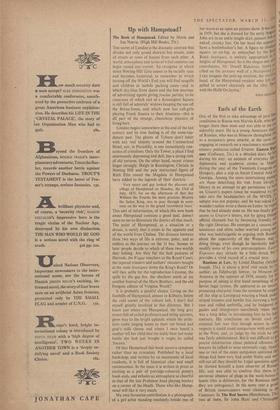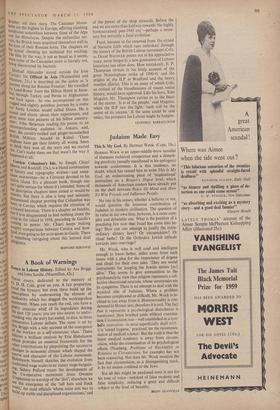Ends of the Earth
ONE of the first to take advantage of post-Till conditions in Russia was Marvin Kalb, who srof longer there than most and was able to see c° siderably more. He is a young American studeo of Russian, who was in Moscow throughout 19' as a temporary press attache, at the same tit, engaging in research on a reactionary nineteenth century politician called Uvarov. Eastern sure (Gollancz, 21s.) is a detailed diary he Iceg.joi during his stay: an account of everyday life It diplomatic and academic circles in Moseeltok during the year of the Twentieth Congress a,' Hungary, plus a trip to Soviet Central Asia PI Georgia. Among the more entertaining passagetit are those describing his trek from library library in an attempt to get permission to 'N°2 on Uvarov's papers (once he wandered by rlt,1 take into the headquarters of the MVD). subject was.not popular, and he was asked wouldn't rather write a thesis on Lenin: he repli that he had already done so. He was finally give access to Uvarov's letters, not by going throa!):1 official channels but by becoming friendly svl the right librarian. He emerges as a sincere, Or scientious and often rather worried young rit who was indefatigable in arguing with Russiav' about the superiority of the Western way doing things, even though he inevitably had I" modify some of his own preconceptions. Easter(' Exposure may already be a little dated, but it
provides a vivid record of a crucial year. j
Russians at Law, by Lionel Daiches (Micha° Joseph, 21s.), is about a brief visit made by 1 author, an Edinburgh lawyer, to Moscow a, Armenia in the summer of 1958, mainly for 1,,r" purpose of seeing at first hand something of IR Soviet legal system. He appeared as an unco promising character from the moment he step' off the ship at Leningrad wearing a black jaQ striped trousers and bowler hat, carrying a hr.l case and rolled umbrella, and he badgered guides and interpreters mercilessly when the was a long delay in introducing him to his 10 contacts. His conclusion on Soviet civil a criminal law was that though severe in sofa( respects it could stand comparison with anything in the West, and, to judge by the trials he sa‘q_' was fairly administered. But it was difficult W get precise information about political offences: 111e,, lawyers he talked to were extremely cagy, though one or two of the more outspoken admitted that things had been very bad under Stalin and were, still not all they should be. Legal questions apart he showed himself a keen observer of Russian life, and was able to confirm that there is e universal absence of plugs in the wash-basins Of hotels (this is deliberate, for the Russians thifl they are unhygienic). In the same year a grotigi of British mountaineers went climbing in Of Caucasus. In The Red Snows (Hutchinson, 25s•P two of them, Sir John Hunt and Christophet THE SPFCTATOR MARCH 11. 1960 Brasher, tell their story. The Caucasus Moun- tains are the highest in Europe, offering climbing Conditions somewhere between those of the Alps and the Himalayas. Despite the unfamiliar ter- rain, the British team acquitted themselves well in the eyes of their Russian hosts. The chapters on The actual climbing are technical but exciting. Ihe title, by the way, is not as banal as it seems, since some of the Caucasian snow is literally red, being discoloured by bacteria. _ Michael Alexander stayed outside the Iron Curtain: urtain: his Offbeat in Asia (Weidenfeld and N. Icelso-, 21s.) is described on the jacket as 'a journey along the Russian Frontier.' He travelled .,ey Land-Rover from the Hilton Hotel in Istan- uul, through Turkey and Persia to Afghanistan rand back again : he was accompanied on this ugged and slightly pointless journey by a svelte but hardy London model called Diana. He is casual and chatty about their experiences, and gives some nice pictures of his fellow country- men John Betjeman reading his poems to an later, audience in Ankara, and, I.ater, the cavalry-twilled and ginger-moustached British Military Attaché in Kabul: 'These Afghans have got their history all wrong. Seem l0 think they won all the wars and we started ,em. Can't make them see that wasn't the way it happened at all.'
Corsica: Columbus's Isle, by Joseph Chiari (Barrie and Rockliff, 25s.), is a bland combination of history and topography written—and some- times overwritten—by a Corsican devoted to his native island. It's a pleasant book, though one !;11 t quite certain for whom it's intended. Some of tne descriptive chapters seem aimed at would-be t9urists but there is also a long and minutely documented chapter proving that Columbus was
a in
Corsica which requires the attention of 4 trained historian. There is a chapter on bandits, but I was disappointed to find nothing about the COUP in the island in 1958, preceding de Gaulle 's ieonung to power. Mr. Chiari keeps making
o
ienghY comparisons between ,Gael and Scot- andt, even going so far as to quote in ic. There IS something intriguing about this learned dual allegiance. 1111 ars hl.
Of
ibli
c
TM
coo" ode'
1i0
Est*, Of"
a an' 5Sar Ty volt
nus'
if W give° rou0 wi0 no ;sigis ay











































 Previous page
Previous page